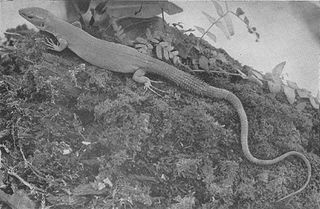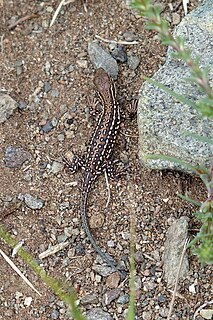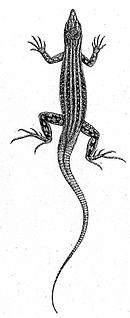
Psammodromus is a small genus of sand lizards of the family Lacertidae. It has six described species, which are found in European and North African countries next to the Mediterranean.

Eremias is a genus of lizards in the family Lacertidae, the wall lizards. They are native to Asia and southeastern Europe, where they live in desert and steppe regions.

Gastropholis is a genus of Equatorial African lacertid lizards of the family Lacertidae which is distributed in southern Liberia, Ivory Coast and Ghana, western Cameroon, Equatorial Guinea, Democratic Republic of Congo, eastern Kenya, Tanzania and south to northeastern Mozambique.

Latastia is a genus of lizards of the family Lacertidae. Species of this genus are distributed in Africa but one subspecies lives in Yemen. Collectively, they are known as long-tailed lizards.

Ophisops is a genus of wall lizards of the family Lacertidae. They are small lacertids characterized by transparent lower eyelids that are completely or partially fused with the upper lids to form a cap over the eye. Species of the genus Ophisops are distributed in southeast Europe, northeast Africa, to west Asia.

Philochortus is a genus of lizards of the family Lacertidae. Species of this genus are distributed in Egypt, Algeria, Libya, Mali, Niger, Ethiopia, Djibouti, Eritrea, Somalia, Kenya, Yemen, and Saudi Arabia.

The La Gomera giant lizard is a lacertid species that can be found on the island of La Gomera, one of the Canary Islands.

Timon princeps, commonly called the Siirt lizard or the Zagrosian lizard, is a species of lizard in the family Lacertidae. The species is endemic to Western Asia.
Letheobia lumbriciformis, also known as the Zanzibar gracile blind snake or wormlike beaked snake, is a species of snake in the Typhlopidae family. It is endemic to East Africa and is known from northeastern Tanzania and from eastern Kenya.

Eremias persica, the Aralo-Caspian racerunner or Persian racerunner, is a species of lizard native to southern Azerbaijan, most of Iran, southern Turkmenistan, Afghanistan, and western Pakistan. Eremias intermedia is also known as the Aralo-Caspian racerunner.

Eremias argus(Korean:표범장지뱀,Chinese:丽斑麻蜥,Russian:Монгольская ящурка), also known commonly as the Mongolia racerunner, is a species of lizard in the family Lacertidae. The species is endemic to Asia. There are two recognized subspecies.
Latastia boscai, also known commonly as the Eritrea longtail lizard or Bosca's long-tailed lizard, is a species of lizard in the family Lacertidae. The species is native to East Africa and the Horn of Africa. There are three recognized subspecies.
Philochortus phillipsi, known commonly as Phillips' orangetail lizard or Phillips' shield-backed lizard, is a species of lizard in the family Lacertidae. The species is endemic to the Horn of Africa.
Pseuderemias brenneri, also known commonly as Brenner's racerunner or Brenner's sand racer, is a species of lizard in the family Lacertidae. The species is native to the Horn of Africa.

Pseuderemias mucronata, the Sinai racerunner or Blanford's sand racer, is a species of lizard found in Egypt, Sudan, Ethiopia, Eritrea, Djibouti, and Somalia.

Pseuderemias smithii, also known commonly as Smith's racerunner or Smith's sand racer, is a species of lizard in the family Lacertidae. The species is native to East Africa.
Pseuderemias striatus, Peters's sand lizard or Peters's sand racer, is a species of lizard found in Kenya, Somalia, and Ethiopia.
Mochlus vinciguerrae, also known commonly as Vinciguerra's writhing skink, is a species of lizard in the family Scincidae. The species is indigenous to East Africa and the Horn of Africa.
Trachylepis hildebrandtii, also known commonly as Hildebrandt's mabuya and Hildebrandt’s skink, is a species of lizard in the family Scincidae. The species is indigenous to the Horn of Africa.














